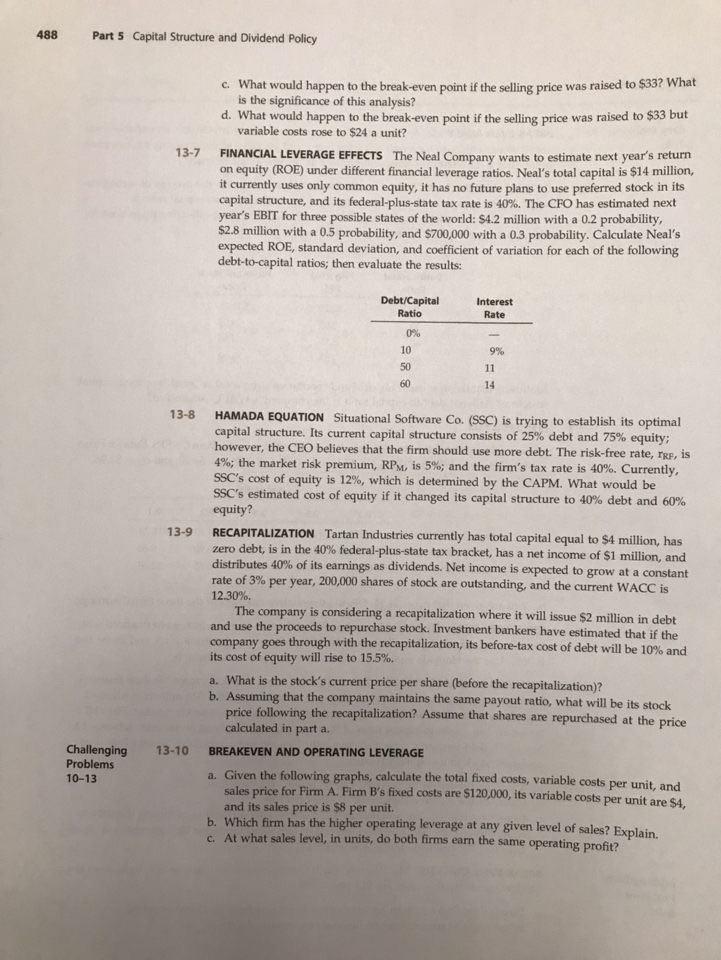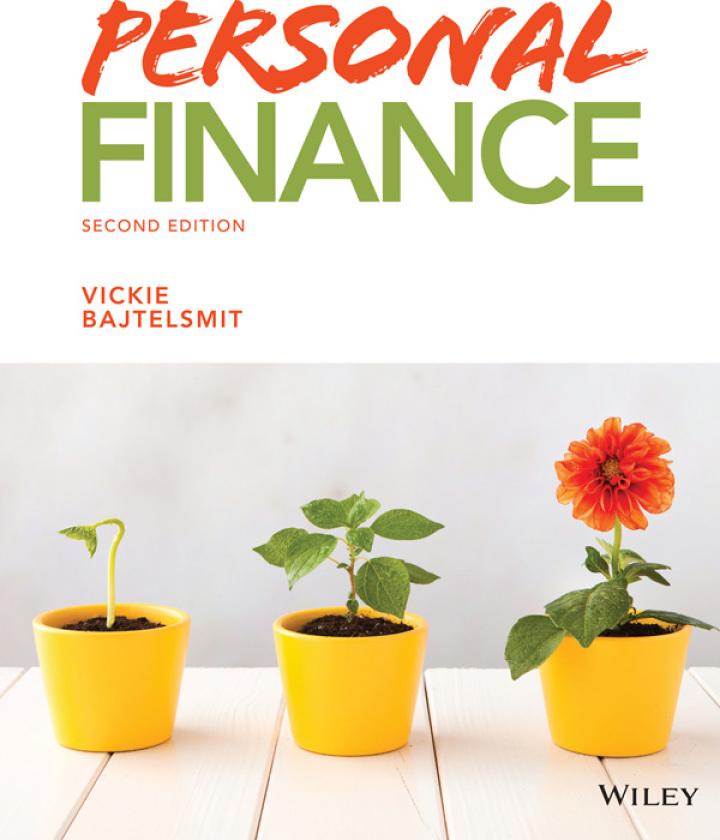Question 13 (10 points)
Go to Problem 13-9 on page 488 to answer the next two questions. Answer question a. in the next blank. GIVE YOUR ANSWER WITH DECIMAL PLACES. DO NOT USE A DOLLAR SIGN.
________________________
For part b., ASSUME THAT SHARES ARE BOUGHT BACK AT $20/share. Answer part b., ROUND YOUR ANSWER TO THE NEAREST WHOLE DOLLAR. DO NOT USE ANY DECIMAL PLACES.
_______________________
488 Part 5 Capital Structure and Dividend Policy 13-7 c. What would happen to the break-even point if the selling price was raised to $33? What is the significance of this analysis? d. What would happen to the break-even point if the selling price was raised to $33 but variable costs rose to $24 a unit? FINANCIAL LEVERAGE EFFECTS The Neal Company wants to estimate next year's return on equity (ROE) under different financial leverage ratios. Neal's total capital is $14 million, it currently uses only common equity, it has no future plans to use preferred stock in its capital structure, and its federal-plus-state tax rate is 40%. The CFO has estimated next year's EBIT for three possible states of the world: $4.2 million with a 0.2 probability, $2.8 million with a 0.5 probability, and $700,000 with a 0.3 probability. Calculate Neal's expected ROE, standard deviation, and coefficient of variation for each of the following debt-to-capital ratios; then evaluate the results: Interest Rate Debt/Capital Ratio 0% 10 50 60 9% 11 14 13-8 13-9 HAMADA EQUATION Situational Software Co. (SSC) is trying to establish its optimal capital structure. Its current capital structure consists of 25% debt and 75% equity; however, the CEO believes that the firm should use more debt. The risk-free rate, rre, is 4%; the market risk premium, RPM, is 5%, and the firm's tax rate is 40%. Currently, SSC's cost of equity is 12%, which is determined by the CAPM. What would be SSC's estimated cost of equity if it changed its capital structure to 40% debt and 60% equity? RECAPITALIZATION Tartan Industries currently has total capital equal to $4 million, has zero debt, is in the 40% federal-plus-state tax bracket, has a net income of $1 million, and distributes 40% of its earnings as dividends. Net income is expected to grow at a constant rate of 3% per year, 200,000 shares of stock are outstanding, and the current WACC is 12.30%. The company is considering a recapitalization where it will issue $2 million in debt and use the proceeds to repurchase stock. Investment bankers have estimated that if the company goes through with the recapitalization, its before-tax cost of debt will be 10% and its cost of equity will rise to 15.5%. a. What is the stock's current price per share (before the recapitalization)? b. Assuming that the company maintains the same payout ratio, what will be its stock price following the recapitalization? Assume that shares are repurchased at the price calculated in part a. BREAKEVEN AND OPERATING LEVERAGE a. Given the following graphs, calculate the total fixed costs, variable costs per unit, and sales price for Firm A. Firm B's fixed costs are $120,000, its variable costs per unit are $4, and its sales price is $8 per unit. b. Which firm has the higher operating leverage at any given level of sales? Explain. c. At what sales level, in units, do both firms earn the same operating profit? 13-10 Challenging Problems 10-13 488 Part 5 Capital Structure and Dividend Policy 13-7 c. What would happen to the break-even point if the selling price was raised to $33? What is the significance of this analysis? d. What would happen to the break-even point if the selling price was raised to $33 but variable costs rose to $24 a unit? FINANCIAL LEVERAGE EFFECTS The Neal Company wants to estimate next year's return on equity (ROE) under different financial leverage ratios. Neal's total capital is $14 million, it currently uses only common equity, it has no future plans to use preferred stock in its capital structure, and its federal-plus-state tax rate is 40%. The CFO has estimated next year's EBIT for three possible states of the world: $4.2 million with a 0.2 probability, $2.8 million with a 0.5 probability, and $700,000 with a 0.3 probability. Calculate Neal's expected ROE, standard deviation, and coefficient of variation for each of the following debt-to-capital ratios; then evaluate the results: Interest Rate Debt/Capital Ratio 0% 10 50 60 9% 11 14 13-8 13-9 HAMADA EQUATION Situational Software Co. (SSC) is trying to establish its optimal capital structure. Its current capital structure consists of 25% debt and 75% equity; however, the CEO believes that the firm should use more debt. The risk-free rate, rre, is 4%; the market risk premium, RPM, is 5%, and the firm's tax rate is 40%. Currently, SSC's cost of equity is 12%, which is determined by the CAPM. What would be SSC's estimated cost of equity if it changed its capital structure to 40% debt and 60% equity? RECAPITALIZATION Tartan Industries currently has total capital equal to $4 million, has zero debt, is in the 40% federal-plus-state tax bracket, has a net income of $1 million, and distributes 40% of its earnings as dividends. Net income is expected to grow at a constant rate of 3% per year, 200,000 shares of stock are outstanding, and the current WACC is 12.30%. The company is considering a recapitalization where it will issue $2 million in debt and use the proceeds to repurchase stock. Investment bankers have estimated that if the company goes through with the recapitalization, its before-tax cost of debt will be 10% and its cost of equity will rise to 15.5%. a. What is the stock's current price per share (before the recapitalization)? b. Assuming that the company maintains the same payout ratio, what will be its stock price following the recapitalization? Assume that shares are repurchased at the price calculated in part a. BREAKEVEN AND OPERATING LEVERAGE a. Given the following graphs, calculate the total fixed costs, variable costs per unit, and sales price for Firm A. Firm B's fixed costs are $120,000, its variable costs per unit are $4, and its sales price is $8 per unit. b. Which firm has the higher operating leverage at any given level of sales? Explain. c. At what sales level, in units, do both firms earn the same operating profit? 13-10 Challenging Problems 10-13







